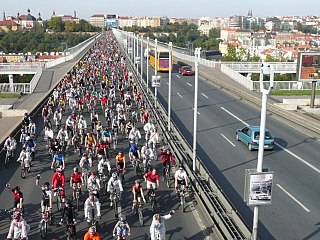 W
WThe car-free movement is a broad, informal, emergent network of individuals and organizations, including social activists, urban planners, transportation engineers, environmentalists and others, brought together by a shared belief that large and/or high-speed motorized vehicles are too dominant in most modern cities. The goal of the movement is to create places where motorized vehicle use is greatly reduced or eliminated, by converting road and parking space to other public uses and rebuilding compact urban environments where most destinations are within easy reach by other means, including walking, cycling, public transport, personal transporters, and mobility as a service.
 W
WCar Free Day Vancouver is a community-based, volunteer-run event in Vancouver, British Columbia, which closes busy streets to car traffic and sets up day-long community festivals to promote active transportation, sustainability, and public spaces. It is similar to other Car-Free Days held around the world. It has traditionally taken place once per year on the third Sunday in June. In recent years it has expanded to events on both the Saturday and Sunday, in addition to an event in North Vancouver in August. The neighbourhoods involved often host smaller block parties in conjunction with a large street festival to celebrate. This day eliminates cars from the event sites along major streets and encourages people in these communities to interact with each other in the spirit of reducing carbon emissions. The larger street festivals include many non-profit organizations, artisans, artists, businesses, and food vendors. Some festivals also include live performances ranging from musical guests, to spoken word, to dance and more. The goals of these events are to remind people of their ecological impact on the city, to decrease dependence on personal vehicles as transportation within the city, to encourage active and alternative forms of transportation, and to help people see streets as public spaces for all.
 W
WWorld Car Free Day, which is celebrated on September 22, encourages motorists to give up their cars for a day. Organized events are held in some cities and countries.
 W
WCarless days were introduced by the Third National Government of New Zealand on 30 July 1979. The enabling legislation was one of several unsuccessful attempts to help the declining New Zealand economy after the oil shocks of the late 1970s—other such policies included the Think Big strategy.
 W
WDivorce Your Car! Ending the Love Affair with the Automobile is a 2000 non-fiction book by Katie Alvord, with a foreword by Stephanie Mills. It was first published on June 1, 2000, through New Society Publishers. In the book Alvord proposes that automobiles have become more troublesome than helpful, as she argues that automobiles contribute to issues like noise and air pollution as well as traffic congestion and urban sprawl.
 W
WEuropean Mobility Week is an annual initiative of the European Commission for Sustainable Urban Mobility since 2002. It calls on European cities and towns to devote one week to sustainable mobility. It starts on September 16 and ends with a Car-Free Day on September 22. Every year, EMW has a specific motto, such as clean air, multimodality or sharing economy. EMW includes traffic-related events, happenings such as cycling critical masses, temporary closures of streets for cars – opening them for pedestrians and cyclists.
 W
WReclaim the Streets also known as RTS, are a collective with a shared ideal of community ownership of public spaces. Participants characterise the collective as a resistance movement opposed to the dominance of corporate forces in globalisation, and to the car as the dominant mode of transport.